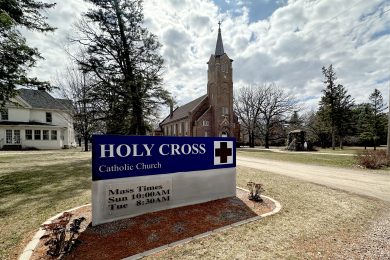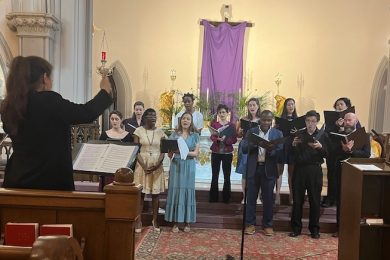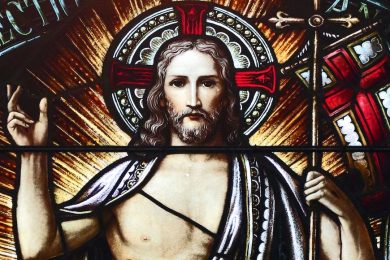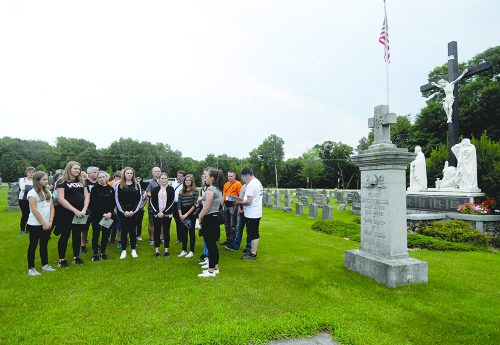39 pilgrims travel from the birthplace of Bishop James Trobec to his gravesite
By Kristi Anderson
The Visitor
Rumor has it that Slovenians have a tradition: Whenever anything important happens, cannons are fired.
httpv://youtu.be/WtiwqHRcKIY
On July 12, in the quiet little town of St. Stephen — proclaimed as the first Slovenian settlement in the United States — the thunderous sound of cannon fire could be heard for miles around.
It was a reunion of sorts, even though few, if any, people had met before. Many who gathered shared the same last names.
Thirty-nine pilgrims from the parish of Polhov Gradec near the capital city of Ljubljana, Slovenia, traveled to the United States to follow in the footsteps of their Slovenian ancestors, including Father Francis Xavier Pierz, former St. Cloud Bishop James Trobec and Bishop Frederic Baraga, all Slovenian missionaries to the United States.
On July 12, they concluded their pilgrimage in St. Stephen, the final resting place of Bishop Trobec. Residents of St. Stephen welcomed the touring group at the parish and were rewarded with the gift of a special song performed by an all-female choir, “Briske Cvetke,” or “The Small Flowers of Brise.”

After hearty welcomes from the local residents as well as Father Eugene Doyle, pastor of St. Stephen Parish, Bishop Donald Kettler and St. Stephen Mayor Jeff Blenkush, parishioner Betty Pogatshnik regaled the crowd with the history of both the town and the parish of St. Stephen, noting numerous Slovenian connections and pointing out artwork in the parish done by Slovenian artists. A collection of artifacts was on display including items belonging to Bishop Trobec.
Following the formal presentation, guests and pilgrims moved outside where the cannons were again fired. Visitors toured the cemetery, finding many of their ancestors’ names on the gravestones.
Members of the Blenkush family recently uncovered the stone of their great-grandmother’s grave, inscribed in Slovenian, and were curious what was written on it. They connected with one of the Slovenian pilgrims, Rebeka Prosen, 18, who translated the message dating back to 1889.
“It is not exact because it is hard to read,” Prosen said, “but it is similar to, ‘You are going to heaven and all good works are going with you.’”
Prosen participated in the pilgrimage with her parents. She said she was excited to see the United States.
“I was surprised because I really like the houses. They are really cute,” Prosen said. “America is also green. There are stereotypes that America is just buildings, and as we are driving from town to town, we see it is not like that. It is very beautiful. Now that we are here, I am very proud that I am Slovenian, that Slovenians made something like this [church and town], that they are well-known in USA.”
The pilgrims chose this time to make the trek because this year marks the 180th birthday of Bishop Trobec and also the 150th anniversary of Bishop Baraga’s death. The trip began July 6 in Lemont, Illinois, a Slovenian community near Chicago, and traveled through parts of Wisconsin, Michigan and northern Minnesota.

Marjan Bradesko, a member of the Polhov Gradec parish, did much of the coordinating of the trip and provided translating when needed. Bishop Trobec was born half a mile from the house where Bradesko lives today.
Bradesko, who has Minnesota relatives, attended the town of St. Stephen’s centennial celebration in 2014. Upon his return, he told his parish priest, Father Bogdan Orazem, about the Slovenian connections in St. Stephen.
Father Orazem, who served as a chaplain in the birth parish of Bishop Baraga, always hoped that someday he would follow the path of Bishop Baraga and when he was assigned to the Polhov Gradec parish, the birthplace of Bishop Trobec, it fueled his desire further. For four years, the parish planned the journey.
Father Orazem spent half of his life in a communist country and said, “My history memory was a little bit erased because it was very bad time during the war. We don’t know much about our great grandparents. When I was 30 years old, I discovered the heritage of my great grandparents. I discovered those who left Slovenia and go to the states to live in Chisholm, Minnesota. This was personal for me,” he said.

“But there are also many people on this trip who remember Bishop Trobec’s family and who also have relatives here. We have all ages on this trip. This is for me very joyful because we managed to bring together so many generations. We want to present their heritage, for them to have a better experience of their history than my generation,” he added.
The group gathered for prayer and more song at the site of Bishop Trobec’s grave and then headed down the street to Trobec’s Bar and Grill where they enjoyed a meal, more conversation and more singing and dancing.
Beverly Supan, who was born and raised in St. Stephen, brought her parents Ben, 91, and Alice, 87, to meet with the tour group because their Slovenian heritage is important to them.
Supan traveled to Slovenia herself and saw the house her ancestors were born in. Earlier this year, some of her distant cousins from Slovenia visited them in St. Stephen.
“This is so meaningful to my family,” she said. “My dad has been talking about it for months. Just coming up to town, to be here, is a very big deal. It is amazing to have this many people come here, and to hear them in their language, singing and telling stories.”
Father Orazem said that none of this would have happened if not for those who came before them.
“We are definitely proud of the Slovenian missionaries who left to come here,” Father Orazem said. “This [pilgrimage] is part of what it means to be missionaries in this time, to meet together and to announce the Gospel and share it together.”





















Do you have any info about the St Stephen s orphanage now destroyed by fire from the 1870’s through the 1880’s ? My grandma and her brother spent some years there when both of their parents died. Last name was Ambrozic . Thanks Anne